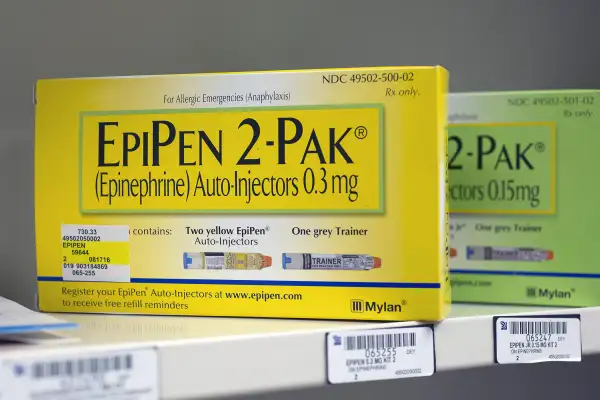EpiPen Profits Are Much Higher Than What Mylan CEO Told Congress Last Week

Last week, Mylan CEO Heather Bresch testified before Congress to defend the $600+ retail price of her company's life-saving EpiPens.
The embattled CEO admitted no wrongdoing and offered no apology for the $300 million in compensation awarded to top Mylan executives as prices for the EpiPen—an auto-injection system that administers adrenaline to those suffering severe allergy attacks—rose 500% in about a decade. Lawmakers described the actions of Mylan as "sickening" and "disgusting," and exhibiting a "blatant disregard" for American families who can't afford medications that could save their children's lives. But what Bresch stressed above all is that the "story got ahead of the facts" regarding EpiPen pricing, and that the profits weren't as outrageous as many people assumed.
After weeks of outcry over EpiPen prices, Mylan increased a rebate offer from a discount of $100 to $300 for customers paying retail. In her prepared testimony before Congress, Bresch explained, then, that Mylan doesn't take in profits anywhere near the $600 list price for a two-pack of EpiPens:
After rebates and various fees, Mylan actually receives $274. Then you must subtract our cost of goods which is $69. This leaves a balance of $205. After subtracting all EpiPen Auto-Injector related costs our profit is $100, or approximately $50 per pen.
Read Next: Mylan Cuts EpiPen Prices, Blames Obamacare Rather than Greed for High Costs
Several members of the House Oversight Committee that grilled Bresch expressed confusion over how the EpiPen's profit could be so low. “I find that a little hard to believe,” Oversight Committee chairman Jason Chaffetz (R-UT) said. “When the juice [the epinephrine in the EpiPen] is a dollar and you’re selling it for $600, there’s some room for profit.” Other committee members repeatedly asked Bresch whether the $50 figure was correct, and she maintained it was.
There now appears to have been good reason for skepticism. The Wall Street Journal reported on Monday that the figures cited by Mylan last week factored in the statutory U.S. tax rate of 37.5%. "Without the tax-related reduction, Mylan’s profits on the EpiPen two-pack would be closer to $160, or 60% higher than the figure the company gave Congress," the WSJ explained.
What's more, while it's not clear how much Mylan pays in taxes, the amount is not anywhere near the tax rate the company factored into its EpiPen profit estimates. Ryan Baum, an analyst for the health care investment firm SSR Health LLC, told the Wall Street Journal that the 37.5% tax rate used by Mylan—and therefore the profit estimate that came as a result of it—"has nothing to do with reality.” He said that Mylan, in fact, paid an overall tax rate of 7.5% last year.
Read Next: Here’s Mylan’s Latest Strategy to Make You Shut Up about High EpiPen Prices
Nonetheless, Mylan says that any lack of clarity on the figures cited by Bresch was unintentional, and it defended the way it included taxes in EpiPen profit estimates. In a statement released to the media on Monday, Mylan explained, "Tax is typically included in a standard profitability analysis and the information provided to Congress has made clear that tax was part of the EpiPen Auto-Injector profitability analysis. In fact, Mylan has provided Congress with a detailed analysis of EpiPen Auto-Injector profitability."
